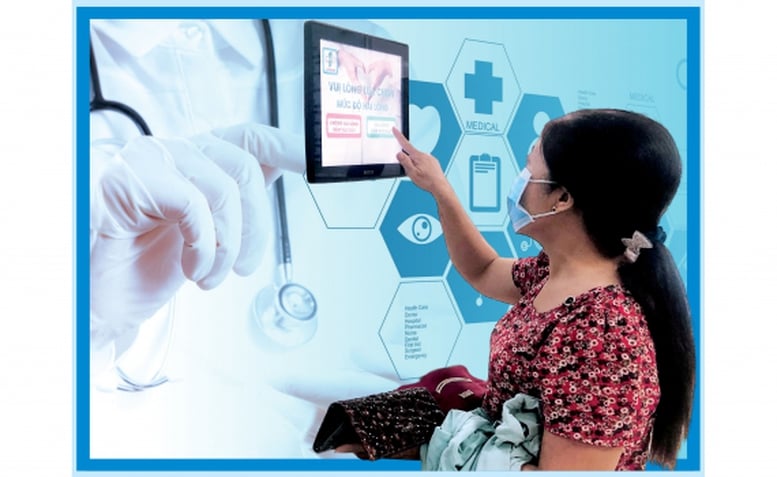
MSc. Truong Van Dat, Deputy Secretary General of Vietnam Young Physicians Association - Photo: VGP
Regarding this content, the reporter of the Government Electronic Newspaper had an interview with MSc. Truong Van Dat, Deputy Secretary General of the Vietnam Young Physicians Association, a PhD student majoring in Hospital Management.
Private Clinics: Essential Components and Digital Transformation Policies
Sir, in the context of the strong development of Vietnam's healthcare system, private clinics play an important role in reducing the burden on public hospitals and providing primary healthcare services. In particular, promoting digital transformation in the private healthcare sector is an indispensable link in the process of modernizing and digitizing the healthcare sector. So, in your opinion, what advantages does private healthcare, including private clinics, have for development?
MSc. Truong Van Dat: The activities of private clinics are regulated in the Law on Medical Examination and Treatment 2023 (Law No. 15/2023/QH15) and related Decrees and Circulars to establish a legal corridor, thereby improving professional skills, strengthening management of activities and stipulating minimum conditions for granting practice certificates as well as operating licenses for medical examination and treatment facilities.
The recent COVID-19 pandemic has promoted the role of private clinics in meeting the urgent needs of the people, but at the same time, it has also exposed some difficulties in managing and connecting digital data in this sector. Currently, regulations on digital transformation, technology standards, or data connection mechanisms for the private health sector are still being finalized.
Promoting digital transformation in the private healthcare sector is an indispensable link in the process of modernizing and digitizing the healthcare sector. This is a policy that has been identified by the Party and the State in many important documents. Resolution No. 57-NQ/TW dated December 22, 2024 of the Politburo has identified science, technology, innovation and digital transformation as strategic breakthroughs, in which healthcare is one of the top priority areas. This is considered a new breakthrough development method to innovate national governance, socio-economic development and national defense.
Plan No. 02-KH/BCĐTW dated June 19, 2025 of the Central Steering Committee is a concrete action to bring Resolution 57 into life, using digital transformation as an important tool to address urgent requirements in restructuring the apparatus and improving the operational efficiency of the political system.
The national digital transformation program, approved under Decision No. 749/QD-TTg dated June 3, 2020 of the Prime Minister, sets a target that by 2025, 100% of healthcare facilities will apply electronic health records, electronic prescriptions and cashless payments. Without effective integration of the private healthcare sector into the digital transformation roadmap, the goal of comprehensive modernization of the national healthcare sector will be difficult to achieve, creating gaps in data-based healthcare governance, reducing service quality and people's experience.
In particular, Resolution No. 68-NQ/TW dated May 4, 2025 of the Politburo on private economic development marked the affirmation of the private economy as "one of the leading important driving forces of the national economy" and "the pioneering force promoting growth, creating jobs, increasing labor productivity, improving national competitiveness, industrialization, modernization and restructuring the economy towards green, circular and sustainable development".
Decree No. 102/2025/ND-CP dated May 13, 2025 of the Government on management, exploitation, sharing and protection of medical data specifically regulates the classification, storage, connection, sharing and security of medical data nationwide. This Decree was advised by the Ministry of Health to be issued as a legal basis for digital transformation in the health sector, especially in the development of medical data infrastructure.
For private clinics with different IT capabilities, understanding and applying regulations on “classification, storage, connection, sharing and security” of medical data is a big challenge. This requires regulatory agencies to soon issue clear, easy-to-understand circulars and technical guidelines, along with support programs so that private clinics can comply effectively.
Decree No. 71/2025/ND-CP dated March 28, 2025 amending and supplementing a number of articles of Decree No. 35/2021/ND-CP has abolished regulations on investment fields and scales for PPP projects in the health sector, thereby helping to expand and increase the attraction of resources from the non-state sector to invest in all areas of the health sector, including health information technology projects.
Expanding the PPP mechanism is key to mobilizing private resources, in line with the spirit of Resolution 68-NQ/TW on ensuring the private economy has equal access to national resources such as capital, technology, and data according to market mechanisms.
The Ministry of Health has also issued Circular No. 13/2025/TT-BYT guiding the implementation of electronic health records, issuing technical requirements for electronic medical record software, connecting with the health insurance system and national database; Circular No. 26/2025/TT-BYT regulating prescriptions and prescriptions of pharmaceuticals and biological products in outpatient treatment at medical examination and treatment facilities; Decision No. 808/QD-BYT dated April 1, 2022 promulgating documents guiding the connection with the national information system on prescription management and prescription drug sales.
However, synchronous application in private clinics requires standard software solutions and a practical implementation support mechanism. Otherwise, small clinics may have difficulty in selecting and implementing suitable software.

Promoting digital transformation in the private healthcare sector is an indispensable link in the process of modernizing and digitizing the healthcare sector.
Digital transformation in private clinics: Bright spots and barriers
So how is the digital transformation going at private clinics in Vietnam today, sir?
MSc. Truong Van Dat: The current state of digital transformation at private clinics in Vietnam shows a multidimensional picture, with bright spots from large facilities but also many challenges in most small and medium-sized clinics.
Some large-scale private clinics, with abundant financial and human resources, have proactively invested in comprehensive management software systems (HIS), telemedicine solutions, digital payments and e-prescriptions. These clinics recognize the importance of technology in improving operational efficiency, service quality and customer experience.
However, larger clinics often have more complex management needs, which drives them to invest in technology, while smaller clinics may lack these conditions, leading to a growing digital divide. Many small clinics face infrastructure and human resource challenges such as a lack of dedicated IT staff to deploy and operate the system, requiring centralized, accessible training and technical support solutions.
Another barrier is the lack of a common standard software platform for private clinics. The Ministry of Health is in the process of reviewing, updating, supplementing and synchronizing technical standards for hospital management software (HIS), electronic medical records software, and medical station management software, moving towards building a set of standards for interoperability of medical data across the industry.
In addition, the understanding of legal documents of private clinics is also a barrier. In the context of the above difficulties, some technology solutions from private enterprises have been formed to integrate many necessary functions such as medical record management, electronic prescription, health insurance connection and internal operation management.
This is a positive signal that needs to be encouraged, standardized and replicated to meet the specific needs of private clinics. The State needs to have a mechanism to evaluate, certify and encourage the use of these solutions, while ensuring compatibility and connectivity with the national system.

It is necessary to issue a set of common software engineering standards (HIS, EMR) specifically applicable to private clinics.
Propose synchronous solutions
So, in your opinion, what specific and synchronous solutions do we need for private healthcare to develop?
MSc. Truong Van Dat: In terms of institutions, we need to issue a set of common software technical standards (HIS, EMR) specifically applicable to private clinics. Currently, the Ministry of Health is reviewing, updating, supplementing and synchronizing technical standards for hospital management software (HIS), electronic medical records software, and medical station management software, moving towards building a set of standards for interoperability of medical data across the industry.
However, the issuance of a set of common software engineering standards (HIS, EMR) specifically applicable to private clinics is necessary to ensure feasibility and suitability for the diverse scale of operations of this sector.
Developing separate software engineering standards that are simplified but still ensure interoperability will help reduce the burden on private clinics, encourage them to invest and comply more easily.
At the same time, it is necessary to complete regulations on data connection between private clinics and the public health system, health insurance, and non-communicable disease management software according to Decree 102/2025/ND-CP regulating the management, exploitation, sharing and protection of medical data and Circular No. 08/2025/TT-BCA of the Ministry of Public Security on the structure of data messages exchanged with the National General Database, including the content on the structure of medical data messages. In the coming time, management agencies need to continue to review, develop and promulgate connection standards, as a basis for units to implement the sharing and interconnection of medical data.
It is also important to refer to international models to learn from the experiences of countries that have been ahead in digital transformation of healthcare, especially how they integrate the private sector. Some policy frameworks and strategies for digital transformation of the private healthcare sector from countries such as South Korea have strongly promoted digital transformation of healthcare through initiatives such as the Digital New Deal and investment in smart healthcare infrastructure; policies to link electronic medical records (EMR) and personal health records (PHR) of private hospitals on the My Healthway platform.
In Vietnam, there have been a number of businesses researching and developing digital transformation technology solutions for the private healthcare sector.
Regarding training and technical support, it is necessary to develop training programs for the private sector on data standards, software, security and system connectivity. To address the shortage of IT human resources and the capacity to access new technical standards, it is necessary to develop specialized training programs for private clinics.
These training courses should focus on practical skills in data standards, how to use management software, principles of health information security, and the process of connecting to the national health system. It is necessary to develop simple, easy-to-understand, easy-to-practice document repositories and instructional videos on the application of information technology in clinic management. These documents can include infographics, step-by-step instructional videos, and short practice manuals to help doctors and clinic staff quickly grasp and apply the requirements of digital transformation without requiring in-depth knowledge of information technology.
Regarding finance, the government needs to soon issue guidelines to include information technology costs in the price of medical examination and treatment services at private clinics. Currently, Decree No. 60/2021/ND-CP requires public health facilities to proactively allocate funds for information technology, but there are no specific regulations on including this cost in the price of medical examination and treatment services. Propose a mechanism to facilitate businesses to quickly implement.
Instead of prioritizing support mechanisms through the budget or PPP, it is recommended to focus on building a legal corridor and institutional infrastructure so that businesses can deploy on a large scale with low social costs.
First, apply a self-declaration mechanism of conformity combined with post-audit based on a set of public standards for electronic prescriptions and EMR.
Second, deploy a technical one-stop portal (Open Health API Registry) that publishes standard APIs/formats to help platforms quickly connect to the national system.
Third, implement non-financial priorities such as recognizing qualified platforms on the portal, prioritizing pilot connections, and participating in standards-building groups.
With this enabling framework, private enterprises can shorten the actual implementation time, rapidly increase the rate of interconnection and compliance, improve the quality of data serving clinics, increase benefits for patients and the health system without relying on direct financial support.
Finally, it is necessary to create a mechanism to access the national health data center and share digital infrastructure according to the National Digital Infrastructure Strategy. It is necessary to create a clear mechanism for private clinics to access and contribute data to the national health data center, and at the same time benefit from sharing digital infrastructure according to the National Digital Infrastructure Strategy. This will help small clinics save on initial investment costs and ensure effective data interconnectivity.
Promoting digital transformation in private clinics is not only an inevitable trend but also a key factor in realizing the strategic goals of Resolution 57-NQ/TW and comprehensively modernizing the Vietnamese healthcare system. The private healthcare sector, with its rapid development and increasing role in primary healthcare, cannot stay out of the digitalization "game".
To ensure that the private healthcare sector is not left behind in the national digital transformation process, there needs to be a coherent, feasible policy system that promotes the role of the private sector. This includes completing the institutional framework with separate software engineering standards and data interconnection regulations, suitable for the characteristics of private clinics.
At the same time, clear financial mechanisms are needed, including the inclusion of IT costs in service prices and specific PPP investment incentive programs.
Finally, increased training, technical assistance and provision of easy-to-understand guidance materials are essential to build capacity and encourage proactive participation of private clinics.
Close coordination between the state and the private sector, based on a legal and technical foundation, thereby achieving the goal of comprehensive modernization and digitalization, bringing practical benefits to the people.
Thank you!
Hien Minh (performed)
Source: https://baochinhphu.vn/chuyen-doi-so-y-te-tu-nhan-mat-xich-quan-trong-trong-hien-dai-hoa-nganh-y-te-10225082013343492.htm





































































































Comment (0)